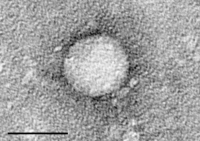
Photo from wikipedia
Chronic infection with hepatitis B virus (HBV) represents one of the main causes of the development of cirrhosis and its complications. Treatment with potent third-generation nucleos(t)ide analogues (NUCs) results in… Click to show full abstract
Chronic infection with hepatitis B virus (HBV) represents one of the main causes of the development of cirrhosis and its complications. Treatment with potent third-generation nucleos(t)ide analogues (NUCs) results in >99% HBV DNA undetectability, and prevents fibrosis progression and liver-related complications. However, NUCs are not able to induce the so-called functional cure, which is hepatitis B surface antigen (HBsAg) loss and anti-HBs seroconversion. Consequently, NUC treatment is currently intended as being long-term or lifelong, resulting in the need for clinical monitoring and potentially suffering from compliance issues. Consequently, drug development in HBV has the goal of developing new agents in order to achieve a functional cure for HBV. Currently, the three main strategies include the following: inhibition of viral replication, inhibition of viral antigens, and immune modulation. This review summarizes the most recent updates concerning HBV compounds among these three main classes.
Journal Title: Viruses
Year Published: 2022
Link to full text (if available)
Share on Social Media: Sign Up to like & get
recommendations!